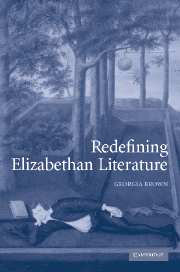Chapter 2 - Generating waste: Thomas Nashe and the production of professional authorship
Published online by Cambridge University Press: 22 September 2009
Summary
WASTE PAPER
From one point of view, the production of printed texts is nothing but the production of waste paper. In Gabriel Harvey's opinion, the breed of professional writers who emerged in the 1590s were as inconsequential as their texts. In Foure Letters (1592), he dismisses professionals, such as Robert Greene and Thomas Nashe, who had just published Pierce Penilesse, as little more than insects, and admits that it irritates him to have to discuss such silly matters:
Alas, he is pitifully bestead, that in an Age of Pollicy, and in a world of Industry, (wherein the greatest matters of Governement, and Valour, seeme small to aspiring capacities) is constrained to make woeful Greene, and beggarly Pierce Pennylesse, (as it were a Grashopper, and a Cricket, two pretty musitians, but silly creatures) the argumente of his stile.
For Harvey, professional writing is a trifling waste of time, but the terrible wastefulness of print was also the consequence of technical progress in late sixteenth-century England. Quantity was not necessarily matched by quality and, compared to manuscript production, the printing press could churn out large numbers of books. Shorter printed books and pamphlets were ephemeral commodities and, however serious their content, they suffered the disintegrative effects of time and use. Printed paper was recycled and put to a number of uses, so that printed texts were often destined to a demeaning passage through material reality.
Nashe's texts shamelessly draw attention to the potential debasement of printed text.
- Type
- Chapter
- Information
- Redefining Elizabethan Literature , pp. 53 - 101Publisher: Cambridge University PressPrint publication year: 2004



